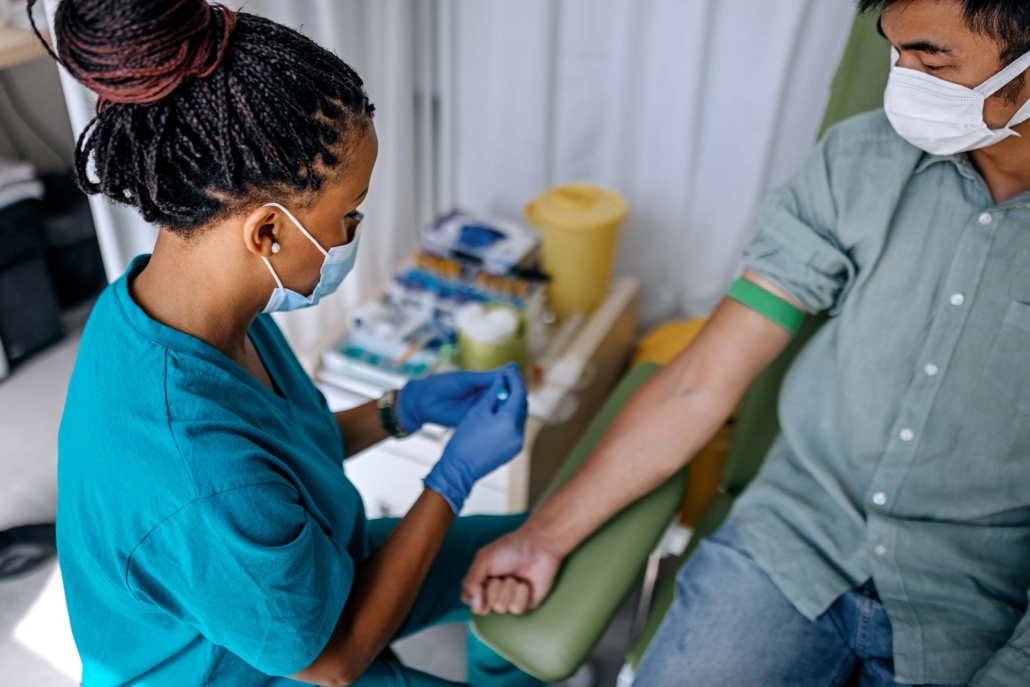What is Hep B?
Hep B is a contagious infection of the liver caused by a virus. For some people, Hep B can pose serious health risks, including cirrhosis and liver cancer.
What are the symptoms of Hepatitis B?
Some people who get Hep B may have few or no symptoms and may never know they are infected. If people do feel sick, usually it’s within six months of becoming infected, though others may experience symptoms later in life. The virus can be passed to others even if the person who has Hep B doesn’t feel sick or show symptoms.
Common symptoms include:
- Loss of appetite
- Fatigue
- Nausea
- Vomiting
- Yellowing of the eyes or skin
How is Hepatitis B spread?
The Hep B virus is transmitted through blood, semen, and other bodily fluids. Hep B is easily spread through sex, or through sharing needles, syringes, and/or other equipment for the use of drugs, hormones, or steroids. You may also be at risk of getting Hep B if you share items such as snorting straws, toothbrushes, or razors that may have blood on them. Pregnant people can pass the virus to their babies at birth, but transmission can be prevented by providing Hep B immune globulin and Hep B vaccine to infants shortly after birth.
Hep B is not spread by casual contact like hugging, coughing, sneezing, or sharing eating utensils.
Who is at higher risk for Hep B?
You can get Hep B at any age, but some people have higher risk, including:
- Men who have sex with men, especially with multiple sex partners
- People who inject drugs or share needles, syringes, and/or other drug equipment
- People with Hep C
- Sex partners of people with Hep B
- People who have sexually transmitted infections
- People with HIV infection
- People who live with someone who has Hep B
- People born in countries where Hep B is common
- Infants born to pregnant people with Hep B
No matter your age, if you think you may have been exposed to Hep B, ask your provider about testing.
How can I prevent Hep B?
The good news is that there is a Hep B vaccine that you can add to your self-care checklist. It’s safe, effective, and administered in three doses over a six-month period. If you’re under 30, there’s a good chance you’ve been vaccinated, so talk to your health care provider.
Plan on getting the Hep B vaccine? Be sure to ask your health care provider about your Hep A vaccine, too.
How else can I prevent Hepatitis B?
The Hep B virus can survive for long periods of time on surfaces, including objects and skin. Because it’s spread through direct contact with blood and body fluids that contain the virus, you can help prevent transmission by:
- Washing your hands, especially after sex
- Using condoms if you have oral, vaginal, or anal sex
- Using a latex barrier for rimming
- Using latex gloves for fingering or fisting
- Disinfecting sex toys
- Avoiding sharing drug injection equipment, including needles or syringes
- Avoiding sharing razors, nail clippers, or nail scissors
Should I be screened for Hep B?
Getting screened for Hep B is key to preventing transmission and reducing your risk of serious illness.
All adults 18 years and older should be screened for Hep B at least once in their lifetime using a triple panel test, which looks for different markers of Hep B.
People who are at higher risk for acquiring a Hep B infection—which includes men who have sex with men, and people with an HIV infection, Hep C infection, or STDs/STIs—should be screened regularly.
How do I get tested for Hep B?
If you think you’ve been exposed, talk to your health care provider about testing for Hep B, as well as Hep A, HIV, Hep C, and STDs/STIs. A blood test can detect Hep B.
Looking for a health care provider? Find a provider near you.
Can Hep B be treated?
In most adults, the Hep B virus eventually goes away on its own, without treatment. Once the virus has left the body, the person will be immune to Hep B and can no longer pass it to others.
However, if the Hep B virus stays in the body, it can become a chronic infection that can lead to cirrhosis or other serious conditions. There are medications available to manage chronic Hep B, but it cannot be cured.














